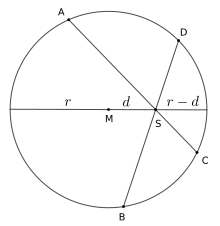Intersecting chords theorem
In Euclidean geometry, the intersecting chords theorem, or just the chord theorem, is a statement that describes a relation of the four line segments created by two intersecting chords within a circle. It states that the products of the lengths of the line segments on each chord are equal. It is Proposition 35 of Book 3 of Euclid's Elements.



More precisely, for two chords AC and BD intersecting in a point S the following equation holds:
The converse is true as well, that is if for two line segments AC and BD intersecting in S the equation above holds true, then their four endpoints A, B, C, D lie on a common circle. Or in other words, if the diagonals of a quadrilateral ABCD intersect in S and fulfill the equation above, then it is a cyclic quadrilateral.
The value of the two products in the chord theorem depends only on the distance of the intersection point S from the circle's center and is called the absolute value of the power of S; more precisely, it can be stated that:
where r is the radius of the circle, and d is the distance between the center of the circle and the intersection point S. This property follows directly from applying the chord theorem to a third chord going through S and the circle's center M (see drawing).
The theorem can be proven using similar triangles (via the inscribed-angle theorem). Consider the angles of the triangles △ASD and △BSC:
This means the triangles △ASD and △BSC are similar and therefore
Next to the tangent-secant theorem and the intersecting secants theorem the intersecting chords theorem represents one of the three basic cases of a more general theorem about two intersecting lines and a circle - the power of point theorem.
References
- Paul Glaister: Intersecting Chords Theorem: 30 Years on. Mathematics in School, Vol. 36, No. 1 (Jan., 2007), p. 22 (JSTOR)
- Bruce Shawyer: Explorations in Geometry. World scientific, 2010, ISBN 9789813100947, p. 14
- Hans Schupp: Elementargeometrie. Schöningh, Paderborn 1977, ISBN 3-506-99189-2, p. 149 (German).
- Schülerduden - Mathematik I. Bibliographisches Institut & F.A. Brockhaus, 8. Auflage, Mannheim 2008, ISBN 978-3-411-04208-1, pp. 415-417 (German)
External links
- Intersecting Chords Theorem at cut-the-knot.org
- Intersecting Chords Theorem at proofwiki.org
- Weisstein, Eric W. "Chord". MathWorld.
- Two interactive illustrations: and